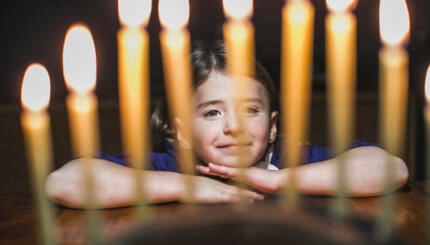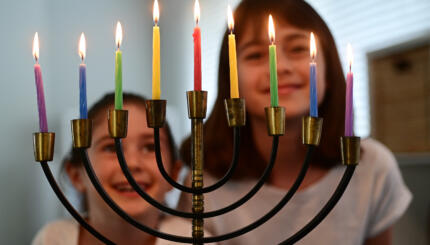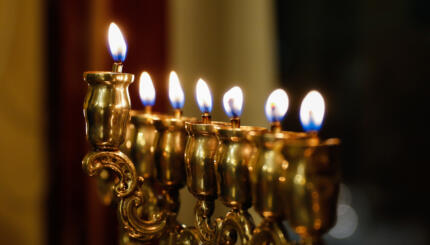Last night our congregation’s chant meditation group met to contemplate light as we arrived at the cusp of the darkest day of the year and looked ahead to the festival of Hanukkah. Many of us in our community have been struggling to see bright times ahead or feel optimistic about what may lie ahead in the USA and beyond as we enter 2017. So the meditation, the inspiration of people chanting together in harmony, and the kavvanot (intentional teachings) that interspersed the chanting provided some timely inspiration and a reminder of ways that we can sustain our own light when we feel we are in darker times.
When the temple stood in ancient times, the olive oil-fed seven-branched was to be kept alight at all times. Likewise, the fires of the altar. Of latter, it is written in Leviticus 6:6 ‘A perpetual fire will be kept burning on the altar; it shall not go out.’ Chanting that phrase over and over in Hebrew to a melody created by master of Hebrew chant meditation, Rabbi Shefa Gold, we felt the energy in the room intensifying.
Over the centuries, commentators extrapolated a broader, more symbolic meaning to this verse to respond to what seemed like an unnecessary repetition. If a fire is called ‘perpetual‘ then why reiterate that ‘it shall not go out‘? And, once the temple has been destroyed, how do you obey a commandment to do something in perpetuity when the physical object to which it refers no longer exists?
One answer was to think more allegorically about what a perpetual light represents. Keeping the faith, holding on to hope, thinking about what kinds of things sustain us and enable us to keep going… these are all ways that we can transform something concrete into a timeless idea. And it is an idea that has helped make such a potent festival of symbolic relevance in every age. While the Maccabee military victory that lies at the heart of the Hanukkah story in the books of Maccabees may have been miraculous in the sense that such a small band defeated an Empire’s army against all odds, that is not the story that most highlight at Hanukkah time. Instead it is the miracle of the oil – sufficient only for one night but, in fact, lasted for eight, that is first found in rabbinic conversations in the Talmud, a couple of centuries later. That switch in focus was partly pragmatic – encouraging others to follow the example of the Maccabees when living under the Roman Empire wasn’t going so well for the Jewish people – but it was also a genius move that turned the festival from the remembrance of a purely historic event into something that would be symbolically inspirational for all the challenging and dark times that Jews would find themselves living in for centuries after.
In our chant circle we contemplated what helps us to keep our inner flame burning. What inspires us? What nourishes us? What gives us hope?
Over these past few months I have been inspired by many local acts of outreach; between individuals forming new networks to support each other, share stories, and organize for advocacy work online, from local town organizations that are consciously bringing people together to ensure greater awareness of diversity and enable people to meet and work together at the local level, from places of worship that have been reaching out to other faiths to build new bridges. It seems to me that we need to do all we can to raise up these stories, and let people know when we are doing things that are affirming, strengthening, and supportive of each other to counter the other narratives that impact us negatively. Where are you finding inspiration this season? What interactions with individuals or organizations are helping to sustain you? In the words of Peter, Paul and Mary, ‘Don’t let the light go out – its lasted for so many years. Don’t let the light go out – let it shine through our hope and our tears.’



